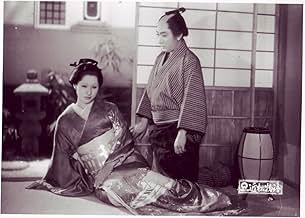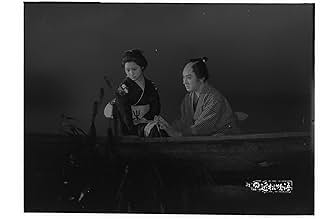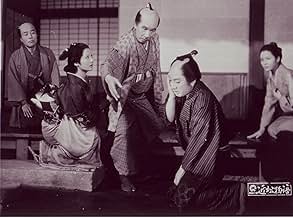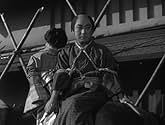PUNTUACIÓN EN IMDb
8,0/10
5,3 mil
TU PUNTUACIÓN
Ishun es un rico escribano que acusa falsamente a su esposa y su mejor empleado de tener una aventura.Ishun es un rico escribano que acusa falsamente a su esposa y su mejor empleado de tener una aventura.Ishun es un rico escribano que acusa falsamente a su esposa y su mejor empleado de tener una aventura.
- Dirección
- Guión
- Reparto principal
- Premios
- 1 premio y 2 nominaciones en total
Eitarô Ozawa
- Sukeemon
- (as Sakae Ozawa)
Reseñas destacadas
This is certainly a good film, beautifully photographed and evocatively acted. Yet one should certainly criticize it, and Mizoguchi, for it is not without flaws and weaknesses. Mizoguchi really cared for women, and wanted to make statements on man's lack of sympathy and total cruelty, yet he sometimes gets ahead of himself in trying to make this statement by adopting the wrong means. This is certainly a case in 'the Crucified Lovers', 'Princess Yang Kwei Fei' and 'Zankiku monogatari'. He sets the scenario in feudal Japan, which leaves the viewer at the end with the partially right exclamation: "boy, does feudalism suck, I'm glad that it is over...". And true, some of the scenarios such weaker films of Mizoguchi present would be literary impossible today. Also, his women characters sometimes become archetypes of unrealistic self-sacrifice, which also simplifies the scenario less appealing. Saying that, "Crucified Lovers" is a good film, with such few relative weaknesses, though the sometimes chilly, cynical prose by Ueda, the screenwriter helps this film allot. I still highly prefer and recommend Mizoguchi's 'realistic, 'contemprary' films of 1936: 'Osaka Elegy' and 'Sisters of the Gion', as well as his late masterpieces, in which he showed more restraint and subtlety: 'Ugetsu', 'Sansho Dayu', and 'The Life of Oharu'.
The only print of CHIKAMATUS MONOGATARI I've been able to find was abysmal - I almost couldn't watch it. Which is a shame as this is among the greatest Mizoguchi films. The story - which I believe had been done before and since by other Japanese directors - is a bit straighter than my favorite Mizoguchi films (SANSHO THE BAILIFF and UGETSU MONOGATARI), and is essentially a tale of tragic romance, in this case a transgressive romance that crosses strict class boundaries. As always with Mizoguchi, there is an exquisitely expressed tone of defiance, and - bad print aside - I was very pleased. As with all of Mizoguchi's films, I'm eagerly awaiting a restored DVD release - whenever that may come...
I saw this over 20 years ago and I remember it well. Superb photography. Great acting by the 2 leads. How things were different in that era compared to today in Japan. This is probably very hard to find on video if it exists at all. But you may see it in art houses like I did. Another Mizoguchi classic. If you like his work, I recommend The Human Condition, the greatest film ever made.
"Chikamatsu Monogatari" , (aka "The Crucified Lovers"), is one Mizoguchi's lesser known works and yet it is no less extraordinary for all that. It is, of course, typical of its director; another tragic tale of corrupted innocence and the terrible hand fate plays in people's lives, in this case a wrongful accusation of adultery over a very simple misunderstanding. Shakespeare could have written this.
It's set in the 17th century and it paints as relentless a picture of cruelty and hypocrisy as Mizoguchi has given us and he shoots it almost in semi-darkness, (even the exteriors take place at night or are shrouded in mist or in shadow), so there is no escape for its protagonists nor for us; the inevitability of the lovers' fate is clearly signposted from the beginning.
As the couple forced to acknowledge their love for each other by unfolding events Kazuo Hasegawa and Kyoko Kagawa are superb, particularly Kagawa whose performance as the wronged wife is a masterclass in subtlety and tenderness. This is surely one of the key films in all of Japanese cinema.
It's set in the 17th century and it paints as relentless a picture of cruelty and hypocrisy as Mizoguchi has given us and he shoots it almost in semi-darkness, (even the exteriors take place at night or are shrouded in mist or in shadow), so there is no escape for its protagonists nor for us; the inevitability of the lovers' fate is clearly signposted from the beginning.
As the couple forced to acknowledge their love for each other by unfolding events Kazuo Hasegawa and Kyoko Kagawa are superb, particularly Kagawa whose performance as the wronged wife is a masterclass in subtlety and tenderness. This is surely one of the key films in all of Japanese cinema.
This film was near the end of a wonderful sequence of films made near the end of his life by Mizoguchi. As Tony Raines says in the DVD extra for the Masters of Cinema edition this was a studio project that he was not wholly enthusiastic about. This shows a little in the film as it lacks some of the real flair and emotional power of some of his earlier great films. However, it shares with them his wonderful flowing camera and great cinematography. Its also a terrific story, based originally on a story from the great Japanese 17th Century playwright Monzaemon Chikamatsu (hence the Japanese name, A Tale from Chikamatsu). The screenplay is skillfully worked from the original story, which depends a lot of some pretty unlikely coincidences.
The film has a great cast, although the lead actor (and major star at the time) Kazuo Hazegawa is a little old for the role of the shy lover. Kyoko Kagawa is great as the wife of a powerful merchant who is mistakenly accused of having an affair with her servant, but then falls in love with him as they both go on the run.
As you'd expect from a Mizoguchi film, technically it is flawless, with lovely sets and some beautiful camera work. The Masters of Cinema version on DVD is a beautiful restoration. For Mizoguchi fans, this film is well worth getting, but for those who haven't seen many of his films it would be better to start with some of his earlier masterpieces.
The film has a great cast, although the lead actor (and major star at the time) Kazuo Hazegawa is a little old for the role of the shy lover. Kyoko Kagawa is great as the wife of a powerful merchant who is mistakenly accused of having an affair with her servant, but then falls in love with him as they both go on the run.
As you'd expect from a Mizoguchi film, technically it is flawless, with lovely sets and some beautiful camera work. The Masters of Cinema version on DVD is a beautiful restoration. For Mizoguchi fans, this film is well worth getting, but for those who haven't seen many of his films it would be better to start with some of his earlier masterpieces.
¿Sabías que...?
- CuriosidadesThe movie is based on a play by the classic Japanese author Monzaemon Chikamatsu (1653-1725). The original title "Chikamatsu monogatari" means "A Tale From Chikamatsu".
- ConexionesFeatured in Histoire(s) du cinéma: Toutes les histoires (1988)
Selecciones populares
Inicia sesión para calificar y añadir a tu lista para recibir recomendaciones personalizadas
- How long is A Story from Chikamatsu?Con tecnología de Alexa
Detalles
- Fecha de lanzamiento
- País de origen
- Idioma
- Títulos en diferentes países
- A Story from Chikamatsu
- Empresa productora
- Ver más compañías en los créditos en IMDbPro
Taquilla
- Recaudación en todo el mundo
- 9311 US$
- Duración
- 1h 42min(102 min)
- Color
- Relación de aspecto
- 1.37 : 1
Contribuir a esta página
Sugerir un cambio o añadir el contenido que falta






























